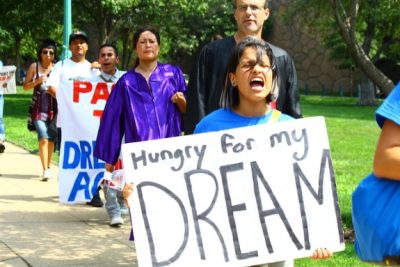Legislation

Lamar Smith Introduces New Agricultural Twist to His Anti-Immigrant Agenda
Rep. Lamar Smith (R-TX), Chairman of the House Judiciary Committee, has added a novel new twist to his anti-immigrant agenda: letting more immigrant workers into the country. In defiance of logic, the man who believes that immigrants merely steal jobs from U.S. citizens now wants to import migrant agricultural workers. At a hearing today of the House Subcommittee on Immigration Policy and Enforcement, Rep. Smith rolled out his latest legislative proposal, called the “American Specialty Agriculture Act” (H.R. 2847). The bill would create a new “H-2C” visa for temporary agricultural workers to replace the existing H-2A program, and would allow growers to bring in up to 500,000 of these workers each year. Read More

California Passes Other Half of DREAM Act Package
While many applauded Governor Jerry Brown’s recent efforts to make college more affordable for all of California’s students, others insisted the state didn’t go far enough. Back in July, Gov. Brown signed AB 130—a bill that allows undocumented students enrolled in California’s public colleges and universities to receive privately-funded university scholarships from non-state funds. At the time, however, its companion bill, AB 131—which would allow undocumented students to apply for state-sponsored financial aid—was stuck in California’s Senate Appropriations Committee. Last week, despite opposition from immigration restrictionists, both California’s State Assembly and Senate approved AB 131 which is now on its way to Gov. Brown’s desk. Many predict Gov. Brown will sign the measure based on promises he made during his campaign. Read More

Using All the Tools in the Toolbox
While it is true that Congress makes the laws and the President executes them, it is also true that the President, the Cabinet, and a host of regulatory agencies spend countless hours interpreting and implementing the laws. Congress can never foresee all of the myriad details that must be worked out to actually turn a law into a functioning process. It falls to the executive branch to carry out that work through the regulatory process—the system of rulemaking and public comment that generally takes place after a law is enacted. However, it is often the case that Members of Congress do not agree with how the executive branch has interpreted and implemented a law. Disputes of this nature can quickly escalate from simple disagreement to frenzied hyperbole. Consider the over-the-top political rhetoric which has characterized much of the immigration debate for many years, with any act of generosity towards an immigrant quickly labeled “amnesty” by some lawmakers. Such rhetoric quickly turns into a pitched battle between Congress, as the maker of the law, and the Administration, as implementer of the law. Read More

What the New Budget Law Could Mean for Immigrant and Refugee Programs
BY ERIC SIGMON, LUTHERAN IMMIGRATION AND REFUGEE SERVICE* On August 2, after a number of press conferences and late-night negotiation sessions, President Obama signed into law the Budget Control of Act of 2011, legislation that prevented the U.S. government from defaulting on its debt and requires deep cuts into future federal spending. While deficit cutting laws may not sound very interesting to the average reader, this new law will decrease the size and role of the federal government over the next decade. Over the next four months, Congress will have to make decisions that will shape the government’s capacity to provide protection and life-saving assistance to refugees, adjudicate immigration benefits, and enforce U.S. immigration laws along the border and in the interior (apprehensions, detentions, deportations). Read More

Local Law Enforcement Not Trained to Enforce Alabama’s Immigration Law
As Alabamans continue to brace themselves for what the New York Times recently described as the “nation’s cruelest immigration law,” state law enforcement agencies said they have not yet been trained to enforce provisions of the controversial law. Signed in June by Gov. Robert Bentley, HB 56 requires local law enforcement to verify the immigration status of those stopped for traffic violations, public schools to determine the immigration status of students, and make it a crime to knowingly rent to, transport or harbor undocumented immigrants. Several parties—including civil rights and religious groups and the U.S. Department of Justice—filed suit against the law, hoping to enjoin key provisions. Today, U.S. District Judge Sharon Blackburn temporarily blocked the law until September 29, 2011 or until the court issues a ruling, whichever happens first. Read More

Federal Judge Temporarily Blocks Alabama’s Immigration Law
Today, the federal judge hearing the case against Alabama’s harsh anti-immigrant law HB 56 issued a temporary order preventing the law from going into effect on September 1, 2011. The judge made no ruling on the merits of the pending motions but rather temporary blocked it to buy… Read More

Immigration and the Defense of Marriage Act (DOMA): A Q&A Fact Check
Q: What is the Defense of Marriage Act?A: In 1996, Congress passed the Defense of Marriage Act (DOMA). Section 3 of DOMA defines marriage as a legal union between one man and one woman. At the time DOMA was enacted, no state permitted same-sex marriages. Today, six states and the District of Columbia permit same-sex marriages; several other states honor out-of-state marriages and/or recognize civil unions. Read More

Religious Community Latest to Join Battle Against Alabama’s Extreme Anti-Immigrant Law
Bishop William H. Willimon, United Methodist Church of North Alabama. With only weeks until Alabama’s extreme anti-immigrant law, HB 56, is slated to take effect (September 1), the coalition of groups challenging the law continues to grow. Shortly after Alabama Governor Robert Bentley signed HB 56 in June, several civil rights groups—including the ACLU—filed a class action lawsuit against Alabama’s law. Earlier this month, the Department of Justice (DOJ) filed suit as well—much like it did against Arizona’s SB1070—in hopes of a receiving a preliminary injunction against key provisions of the law. This week, faith leaders in the state—who also filed suit against the law—added their voice to the chorus of civil rights, law enforcement, businesses, education, and international communities who vocally oppose the law. Read More

50 States Work on Immigration Legislation While Congress Refuses to Act
The National Conference of State Legislatures (NCSL) recently released an analysis of the number of immigration-related proposals introduced at the state level between January and June of 2011. NCSL found that more immigration-related bills (1,592) were introduced in the first half of 2011 than in the same time period in 2010 (1,374). While the bills weren’t all bad—representing both a mixed bag of punitive and progressive proposals—they tell a bigger story of 50 states grappling with a broken immigration system while Congress sits back and watches. Read More

What’s the Value of Keeping Undocumented Youth in the Shadows?
The real life psychological ramifications of young immigrants struggling with their unauthorized status are often glossed over in the larger immigration debate. In a recent journal article, Learning to Be Illegal: Undocumented Youth and Shifting Legal Contexts in the Transition to Adulthood, University of Chicago professor Roberto G. Gonzales uses 150 interviews with young Latino adults to examine how unauthorized youth deal with their legal status as they come of age. Gonzales finds that as unauthorized immigrant children transition into adulthood, many “learn to be illegal,” figuring out how to exist in a society that was once welcoming, but now prohibits their participation. Read More
Make a contribution
Make a direct impact on the lives of immigrants.
